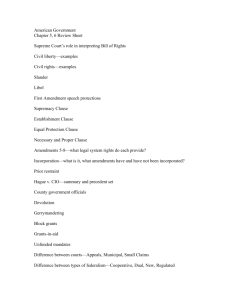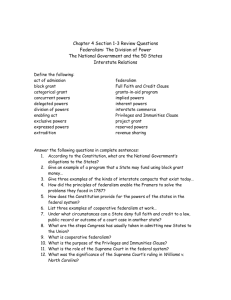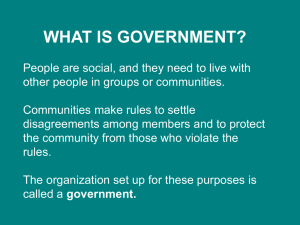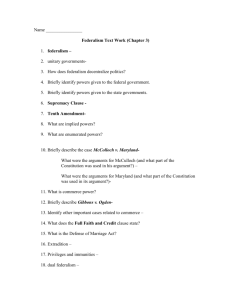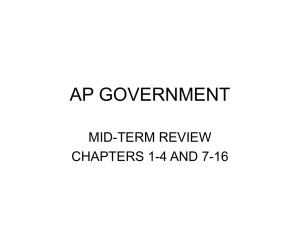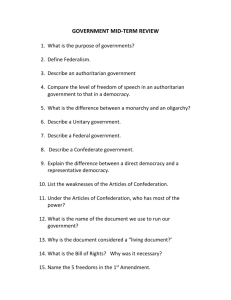Ch. 4 PPT
advertisement
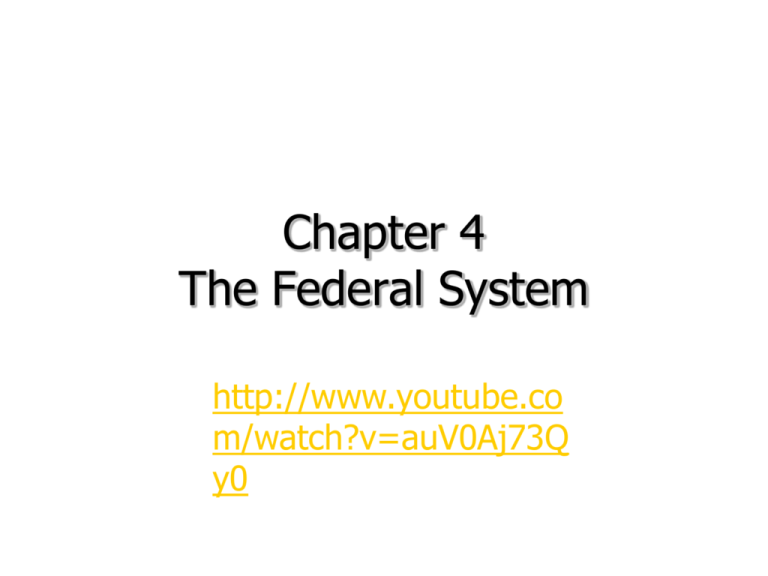
Chapter 4 The Federal System http://www.youtube.co m/watch?v=auV0Aj73Q y0 Federalism: The Division of Power • Objectives: – Define federalism and explain why the Framers chose this system of government. – Identify powers delegated to and denied to the National Government, and powers reserved for and denied to the States. – Understand that the National Government holds exclusive powers; it also holds concurrent powers with the States. – Explain the place of local governments in the federal system. – Examine how the Constitution functions as “the supreme Law of the Land.” Federalism: The Division of Power • Political Dictionary: – – – – – – – – – Federalism Division of powers Delegated powers Expressed powers Implied powers Inherent powers Reserved powers Exclusive powers Concurrent powers Federalism: The Division of Power • Why It Matters: – The federal system divides government power in order to prevent its abuse. There are two basic levels of government in the federal system---National and State. The Supreme Court settles disputes between the two. – Federalism is a way of organizing a nation so that both national and state levels of government have authority over the same land people. For instance we have federal and state laws we must follow. Federalism: The Division of Power • Federalism Defined: – Division of powers between a National Government and various State governments. – Dual system with areas of authority. – Preserves local character of laws. • Liquor, gasoline, voter registration, sales tax, income tax, drivers licenses, unicameral, etc. – Big matters like national defense and natural disasters can be handled nationally. Federalism: The Division of Power • Powers of the National Government. – Delegated Powers—those granted to the National Government by the Constitution. – 18 clauses, 27 powers—Article I, section 8. – Expressed Powers—Meaning directly stated in the Constitution spelled out in words. These are the first 17 clauses. • Authority includes the power to levy and collect taxes, to coin money, to make war, to raise and army and navy, and to regulate commerce among the states. – Implied Powers—not spelled out but reasonably suggested. • “Necessary and Proper” Clause the 18th clause • It empowers Congress to pass laws needed to carry out the enumerated powers. • Convenient and Useful—Elastic Clause – Highways, interstate crime, racial discrimination, interstate commerce. Necessary and Proper Clause-Article 1 sec. 8 (Elastic Clause) • “Congress shall have power…to make all Laws which shall be necessary and proper for carrying into Execution the Foregoing powers, and all other powers vested…in the Government of the United States…” The Supreme Court and Federalism. McCulloch v. Maryland—1819, involved the attempt of the Maryland legislature to tax the Second Bank of the United States. This case resulted in the foundation for the expansive authority of Congress. It was focused around a strict or broad interpretation of the necessary and proper clause. The Supreme Court ruled in favor of a broader interpretation. The Supreme Court is the “umpire” of the federal system. Federalism: The Division of Power • Powers of the National Government (cont.) – The Inherent Powers—few in number, but usual and customary for national governments. Those powers that the national government may exercise simply because it is a government are its inherent powers. • Immigration, diplomatic affairs, protection against rebellion, etc. Federalism: The Division of Power • Powers Denied to the National Government. – Powers to levy duties on exports between states. – Prohibit freedom of religion, speech, press, or assembly. – Conduct illegal searches or seizures. – Deny to any person accused of a crime a speedy and public trial or trial by jury. Federalism: The Division of Power • Powers Denied to the National Government. – By silence because all national powers must be given expressly, implicitly, or inherently. • Power to create a public school system. • Enact uniform marriage and divorce laws. • Set up local units of government. – Powers that would destroy the federal system. • Taxation of States in doing their natural functions. Federalism: The Division of Power • The States – Powers Reserved to the States. • Reserved Powers. – Can deal with marriage, liquor, pornography, prostitution, gambling, licensure of professionals, drug trafficking, land use laws, regulation of utilities – Police power – Section 2 of the 21st Amendment grants unlimited power to regulate the manufacture, sale, and consumption of alcoholic beverages. Federalism: The Division of Power • The States (cont.) – Powers Denied to the States. • Treaties, alliances, or confederations. • Print or coin money. • Deprive one of life, liberty, or property without due process of law. • Inherently the States may not tax the functions of the National Government. • State Constitutions limit State Government too. The Supremacy Clause What happens when states exceed their reserved powers and pass laws that conflict with national laws? Which law is supreme? Article VI, Section 2---makes the acts and treaties of het United States supreme. For this reason it is called the supremacy clause Federal law=”the supreme Law of the Land.” No state law or state constitution may conflict with any form of national law. Federalism: The Division of Power Concurrent Powers: The powers the federal government and the states share. Each level of government exercises these powers independently. • Taxation • Define and punish crimes • Condemn property • Establish courts • Create laws The National Government and the 50 States • Objectives: – Summarize the obligations that the Constitution places on the nation for the benefit of the States. – Explain the process for admitting new States to the Union. – Examine the many and growing areas of cooperative federalism The National Government and the 50 States • Political Dictionary: – Enabling Act – Act of Admission – Grants-in-Aid Program – Revenue Sharing – Categorical Grant – Block Grant – Project Grant The National Government and the 50 States • The Nation’s Obligation to the States – Republican Form of Government • Not defined but generally means “representative.” The Supreme Court says this is a political question. • After the Civil War Southern States had to ratify the 13th, 14th, and 15th Amendments to be readmitted. – Until they did they were considered “not-republican.” The National Government and the 50 States • The Nation’s Obligations to the States (cont.) – Invasion and Internal Disorder • Original intention is obsolete. • Now occasionally used to protect against “Domestic Violence.” Governor usually requests. – Race conflict of the 1960s – Ravages of nature – Respect for Territorial Integrity The National Government and the 50 States • Admitting New States – No new state may be created by taking territory from another without their consent. – 37 added since the original 13 • The steps necessary for a territory to become a state – Enabling Act-The procedure for admission begins when Congress passes the enabling act. An enabling act, when signed by the president, enables the people of the territory interested in becoming a state to prepare a constitution. – State Constitution prepared and reviewed by Congress. – Popular vote(to approve the constitution). – Act of Admission by Congress. – Conditions for Admission • Rare restrictions • Restrictions are often void after admission. Interstate Relations • Objectives: – Explain why States make interstate compacts. – Understand the purpose of the Full Faith and Credit Clause. – Define extradition and explain its purpose. – Discuss the purpose of the Privileges and Immunities Clause. Interstate Relations • Why It Matters – What if Texas citizens were not allowed to travel to Oklahoma, or needed a special passport to do so? What if your Texas driver’s license were not valid when you drove through Ohio? Fortunately, several key provisions in the Constitution promote cooperation between and among the States. Interstate Relations • Political Dictionary: – Interstate Compact – Full Faith and Credit Clause – Extradition – Privileges and Immunities Clause Interstate Relations • Interstate Compacts-written agreements between two or more states. Compacts may deal with issues like water/air pollution, toll bridges, and transportation. – Must have the consent of Congress (prevents states from threatening the Union by making alliances) – More than 200 Compacts exist today • Full Faith and Credit-Each state must recognize the laws and legal proceedings of the other states. For example a car registration of one state must be accepted by all other states. Without this each state could treat all other states like foreign countries. – Applies only to civil, not criminal matters. Interstate Relations • Extradition-Mandatory “A person charged in any state with treason, felony, or other crime, who shall flee from justice and be found in another State, shall on demand of the executive authority of the State from which fled, be delivered up, to be removed to the State having jurisdiction of the crime.” • Privileges and Immunities-This clause means that one state may not discriminate unreasonably against citizens of another state. Ex- Charging people more in toll fees if they are not from Texas. – For some privileges residency can be a required standard---voting, hunting/fishing, out of state tuition, etc. Lawsuits Between States • Suits among two or more states are heard in the United States Supreme Court, the only court in which one state may sue another. • Cases may involve topics like water rights, sewage,pollution and boundary rights. Federalism and Politics • The course of action a government takes in • • response to some issue or problem is called public policy. Federalism affects public policy in two ways. First, it affects how and where new policies are made in the U.S. Second, it introduces limits on government policy making. Colorado pioneered the use of sunset laws. It requires periodic checks of government agencies to see if they are still needed. Florida passed a sunshine law prohibiting public officials from holding closed meetings.

